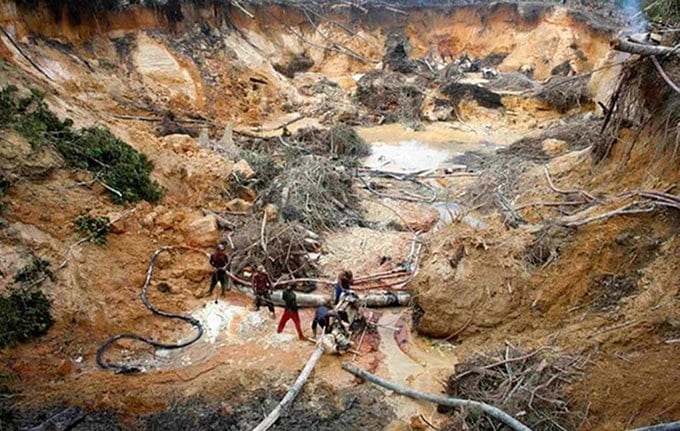
Another massacre took place in the south of Venezuela over the control of the gold mines that Nicolas Maduro’s regime has allocated to terrorist groups. Between 6 and 8 people were shot in the state of Bolivar.
ORO DE SANGRE. No voy a publicar las fotos, pero ellas delatan la masacre llevada a cabo por grupos criminales entre los que se menciona a organismos policiales del Estado Bolívar, actuando en compañia de bandas de pranes por el contról de areas mineras de la parroquia Icabarú
— Andres Velasquez (@AndresVelasqz) November 24, 2019
This is one of the most important states in the country for economic reasons. After the decline in oil production, Bolivar has become the scene of massacres perpetrated by guerrillas and gangs that want to take over the Venezuelan gold mining. Although there is no official information issued by the regime, it is known that the murders took place in Ikabaru, an area in the south of the country where a good part of the gold and diamond deposits are found.
The Venezuelan Education-Action Program on Human Rights (PROVEA) reported that on Friday 22nd November, around 7 p.m., an armed group allegedly linked to the “sindicato del Ciego” arrived at the Pemon indigenous community looking for the chief of a mine in the region. Reuters news agency reported that out that an indigenous man and a military serviceman are among the dead.
According to the PROVEA, criminal groups or mining “unions” seek to control the industry through violence and establish a system of exploitation in the area such that they “coexist with the state.”
A report published at the end of October by the Washington Office on Latin America (WOLA) pointed out that mining revenues currently provide a financial lifeline for political elites in Venezuela and are critical to maintaining power.
“The lack of transparency in government accountability, including the issue of extralegal revenues derived from resource extraction, deprives the population of their rights and facilitates authoritarianism. Call them guerrillas, unions, ‘prans’ or corrupt factions of the army: they are here to stay,” the report explains.
After the massacre, interim President Juan Guaido said, “They massacre our indigenous people to steal gold from the Venezuelans! Will the military continue to tolerate such humiliation of our people?”
It is not the first time that Venezuela has suffered a massacre because of the dispute over control of the gold mines. In May 2018, 20 people were murdered in Venezuela by the Colombian guerrilla ELN. In 2016, there was also the Tumeremo massacre, which was perpetrated by gangs led by Jamilton Andres Ulloa Suarez, alias el Topo, and caused the death of 28 miners.
The importance of Bolivar in the mining business
In recent years, the state of Bolivar has remained in the hands of Chavismo. We could have easily foreseen that in the last regional elections, the regime would do the “impossible” to form its government in the state despite having been defeated. In the south of the country, the mining areas of Bolivar are under siege by armed groups who govern these entities with impunity.
In Venezuela, gold mines have been handed over by the regime to contractors, front men, criminal gangs, and armed groups such as the Colombian guerrilla ELN, explicitly violating and abusing the nation’s resources.
The Orinoco mining arc is located in this state and covers an area of approximately 114,000 square kilometers, located in southeastern Venezuela, bordering Brazil. Minerals such as coal, manganese, gold, iron, bauxite, copper, chromium, magnesite, nickel, diamond, phosphate, limestone, feldspar, dolomite, gypsum, kaolin, graphite, and talc are extracted there.
According to a report by Dutch journalist Bram Ebus, the mafias, many of them operating from prisons, began taking control of Venezuelan mines in 2011, after the Venezuelan government nationalized much of its mining industry.
Ebus explains that the Venezuelan military is secretly involved in the illegal gold industry, supporting gangs in exchange for a share of their profits: “Miners pay extortion money, known as ‘vacuna,’ to prans or prison leaders in exchange for being allowed to work.
The bloody battles of rival gangs for control over the mines have made Bolivar one of the most dangerous states in the country. The bodies of miners, shot by bullets, have become disturbingly common sight. In this world, where violent killings and corrupt policies are part of everyday life, the Venezuelan government is trying to attract multinational mining companies, a move that many fear may further undermine the environmental integrity of this remote region and exacerbate human rights abuses.
Currently, it is almost impossible to calculate the amount of gold in the Venezuelan mining arc. It is believed that there could be about 8000 tons, equivalent to more than 240 billion euros.
 Versión Español
Versión Español












